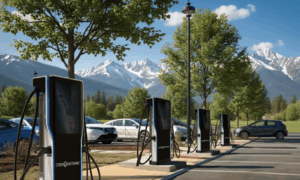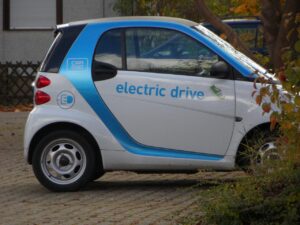
Home / EV Charging News / The Rise of Electric Cars: How they’re disrupting the auto industry and what it means for the future of transportation
Electric cars have been gaining popularity in recent years, driven by a growing concern for the environment and the need for more sustainable modes of transportation. With the rise of electric cars, the auto industry is undergoing a major transformation. In this article, we will explore the impact of electric cars on the auto industry and what it means for the future of transportation.
There are several benefits to owning an electric car. First and foremost, electric cars have a reduced environmental impact compared to traditional gasoline-powered cars. They emit fewer greenhouse gases, making them a more sustainable choice. Additionally, electric cars have lower operating costs, as they are more energy-efficient and require less maintenance. They also offer a better performance and driving experience, with instant torque and a quieter ride. Finally, electric cars often come with improved safety features, such as automatic emergency braking and lane departure warnings.
Despite the benefits, there are several challenges to owning an electric car. One of the biggest challenges is the limited driving range. Most electric cars can only travel around 200-300 miles on a single charge, which can be a problem for longer road trips. Additionally, there is a lack of charging infrastructure in many areas, making it difficult to find a charging station on the go. Furthermore, electric cars have higher upfront costs than traditional cars, although this is starting to change as prices come down. Finally, battery technology still has some limitations, such as limited lifespan and the potential for degradation over time.
Governments can play a key role in promoting the adoption of electric cars. One way they can do this is through tax incentives and rebates, which can make electric cars more affordable for consumers. Additionally, governments can invest in charging infrastructure to make it easier for people to charge their cars on the go. Finally, governments can support research and development in battery technology to improve the performance and longevity of electric car batteries.
The future of electric cars looks bright. Battery technology is advancing rapidly, which will help to increase the driving range and reduce charging times. Additionally, charging infrastructure is becoming more widely available, making it easier for people to charge their cars on the go. Competition among automakers is also increasing, which will help to drive down prices and improve the quality of electric cars. Finally, electric cars have the potential to transform the transportation sector, with the potential for autonomous driving and a shift towards shared mobility services.
The rise of electric cars has had a significant impact on the auto industry. Traditional automakers are investing heavily in electric car technology, as they recognize the need to compete in this rapidly growing market. Many have set ambitious targets for the number of electric cars they plan to produce in the coming years. At the same time, new players are entering the market, such as Tesla, Rivian, and Lucid Motors, which are focused exclusively on electric cars.
The shift towards electric cars has also had an impact on the supply chain. Electric cars require different components than traditional cars, such as batteries and electric motors. This has created opportunities for new suppliers to enter the market, while traditional suppliers have had to adapt to the changing demand.
One of the main drivers of the shift towards electric cars is the need for a cleaner and more sustainable mode of transportation. Electric cars emit fewer greenhouse gases than traditional cars, which can help to reduce the impact of transportation on the environment. Additionally, electric cars can be powered by renewable energy sources, such as solar or wind power, further reducing their environmental impact.
Electric cars also have the potential to reduce our dependence on fossil fuels. As the technology improves and the cost of electric cars comes down, more people will be able to make the switch from gasoline-powered cars to electric cars. This will help to reduce our consumption of oil and other fossil fuels, which are a finite resource.
The rise of electric cars represents a major shift in the auto industry and a step towards a cleaner and more sustainable future. While there are still challenges to overcome, such as limited driving range and a lack of charging infrastructure, the benefits of electric cars make them an attractive option for consumers and governments alike. As technology continues to improve and adoption rates increase, electric cars will play an increasingly important role in the transportation sector. The future of transportation looks electric, and this is a positive development for both the environment and for consumers.



